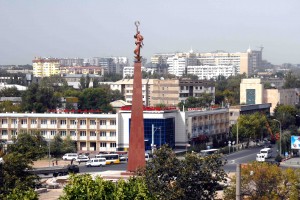ASTANA – The London-based European Bank for Reconstruction and Development (EBRD) is supporting improving energy efficiency in Kazakhstan by facilitating foreign direct investment in the refurbishment of one of the country’s largest cement plants, based in the southern city of Shymkent.
 According to the bank’s Dec. 3 press release, a loan of up to 5 billion tenge (€20 million equivalent) will be provided to Shymkentcement, the Kazakh affiliate of Italcementi Group, one of the largest cement producers in the world. In addition, the EBRD is subscribing to up to 1 billion tenge (€4 million equivalent) of shares in Shymkentcement acquiring an equity stake of around 21 per cent.
According to the bank’s Dec. 3 press release, a loan of up to 5 billion tenge (€20 million equivalent) will be provided to Shymkentcement, the Kazakh affiliate of Italcementi Group, one of the largest cement producers in the world. In addition, the EBRD is subscribing to up to 1 billion tenge (€4 million equivalent) of shares in Shymkentcement acquiring an equity stake of around 21 per cent.
Shymkent is a major industrial city and a sprawling transportation hub in the south of Kazakhstan. It already has an estimated 900,000 population and is listed as one of the four regional agglomerations in the country that will be developed under a national plan, the other three being Astana, Almaty and Aktobe.
For decades, Shymkent also had major issues with environmental pollution from about a dozen large heavy-industry plants, including lead, oil processing, tire, phosphorus and cement plants. The cement plant itself has existed since 1958, and the cement it produced was used in building up the Baikonur Cosmodrome, the airports in Almaty and Tashkent, several hydropower stations as well as the Karakum channel and other notable facilities in Kazakhstan and neighbouring countries.
The concentration of industrial plants in Shymkent as well as the confluence of several railway lines and automobile roads sustained the continuous growth of the city and its ranking as one of the most industrialised, and polluted, cities in the former Soviet Union.
The situation with pollution began to change after the collapse of the USSR, the closure of old heavily polluting enterprises and the introduction of modern technologies by the new owners of the industrial plants.
The newly announced EBRD financing will facilitate the replacement of four existing “wet process” kilns with a new, energy-efficient “dry process” facility. An important example of private-sector FDI in the fast-growing Shymkent region, the project highlights the region’s attractiveness even at a time when the global investment climate remains uncertain, the lender said in the press release.
“The new plant will provide modern, efficient local production capacity to support the development of infrastructure, as well as helping to reduce carbon intensity in the Kazakh cement industry. Moreover, it will set a replicable example of introducing alternative fuels, the first time on such a scale in Kazakhstan,” the release noted.
The investment will also contribute to the ongoing EBRD policy dialogue with the Kazakh authorities in regard to CO2 emissions regulations and align the Kazakh emissions-trading systems with international standards.
It is expected that Shymkentcement in turn will expand its comprehensive energy and environmental-management systems. The company will also undertake education initiatives, providing traineeships and placements in collaboration with local universities and colleges to spread knowledge about energy-efficient technology and environmental best practice.
“We are pleased to join forces with Italcementi Group to invest in local, energy-efficient production facilities which will support infrastructure development in the fast-growing region of Shymkent. This is an important step towards a more efficient, less carbon-intensive future for the industrial sector of Kazakhstan,” said Janet Heckman, EBRD Director for Kazakhstan, said, according to the press release.
“We are proud to partner with the EBRD in this important project in Kazakhstan. This investment is aligned with our goal to become a leader in economic and environmental sustainability across all markets where we operate through the important efficiency gains that the new plant will achieve,” Gabriel Morin, Managing Director of Italcementi Group in Kazakhstan, said.
Since the beginning of its operations in Kazakhstan, the EBRD has invested close to US$ 6.75 billion in the country’s economy, with more than half of the total supporting projects in the private sector.
The EBRD, owned by 64 countries and two intergovernmental institutions, is supporting the development of market economies and democracies.
